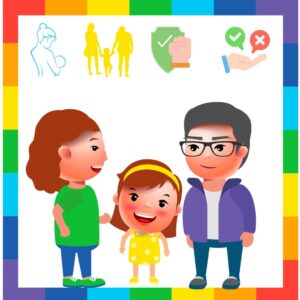
Parenting Tips
Parenting & Self-esteem in Children: Pure Love Only Builds
April 23, 2022
Related
Topics

Hey
-

Parents Saying ‘No’ – How to Set Limits Without Guilt?
July 15, 2025
-

-

Green Parenting: How to Make Your Home More Eco-Friendly?
April 24, 2025
-

How Can Parents Prepare for a Second Child? Simple Guide 101
March 28, 2025
-

Ready for more?
Hey
Sign up for Rainbow Kiddies newsletters for more stories and updates
Healthy self-esteem is what makes you optimistic and confident. It helps you handle pressure, have a relaxed attitude and have the desire to learn. In addition it helps you believe in your abilities and accept criticism. Lastly, but most importantly, it helps you love yourself just the way you are. Building self-esteem is a long drawn process. While most of it is impacted by parenting the rest is impacted by the larger environment.
Major causes of low self-esteem:
Parenting issues
- Neglect from parents during childhood
- Lack of love from parents
- Excessive criticism from parents
- Remarks on physical appearance made by parents
- Too much pressure for making achievements
Environmental impact
- Negative Experiences
- Remarks on physical appearance
- Puberty and related factors
- Social interaction and negative reactions/ experiences
- Disabilities
Self-esteem is important at every stage of life. It affects your life, work and relationships. It plays a huge role in shaping your personality, behavior, self-image, health and communication skills. Good self-esteem helps you to be assertive in expressing your opinions and needs. It makes you feel confident about yourself and in your ability to make decisions. It helps you form honest and secure relationships and not cling on to unhealthy/ abusive ones. Additionally, you tend to have realistic expectations of yourself and others. It also makes you more resilient to stress and failures.
With healthy self-esteem you are less likely to experience hopelessness, worthlessness, guilt and shame. You will also be able to guard yourself from a volley of mental health conditions like eating disorders, addictions, depression, anxiety, etc.
Having said that, high self-esteem can be dangerous too, and is not healthy. Healthy self-esteem is all about having a balanced and accurate understanding of yourself.
How to build self-esteem In:

Babies and Preschoolers
There are several little ways in which we can help build self-esteem in kids early on. Start early by practicing attachment parenting. Attend to and fulfill your babies’ needs consistently. Feed them when hungry, be quick to respond. Help them sleep when they are cranky/ tired. Give them a change of diaper or clothes when they are soiled or uncomfortable. This should start as soon as they are born. Being well attached to them will help them learn trust and thrive.
Moving on to early childhood, let them initiate play and you follow or imitate them. You should also give them responsibilities that are within their capabilities and suitable for their age. For example, get toddlers to tidy their toys, fold little clothes, clean up small messes, leave their plates at the sink, wear their clothes and shoes, etc. This will help them learn how to take initiative and handle responsibilities.
All Age Groups
Focus on their positive aspects and strengths rather than pushing them to achieve something that is way beyond their capabilities or interests. When you talk to them make them feel heard and be compassionate. Encourage them to express their feelings. This will also make them feel comfortable about confiding in you. This way you can monitor environmental influences on them. You can make sure that their experiences at school/ neighborhood or society are not impacting them negatively.
As parents/ teachers/ caretakers what we can do best for our kids is to not compare them with each other. Make them realize that each one of them is unique. Accept and love them just the way they are. Help them understand that every person is different and that is what makes each one of us special too. While you refrain from overly criticizing them, also make sure that they do not indulge is unhealthy self-criticism. Watch this story on how we can nurture healthy self-esteem in our near and dear ones.
Make sure that they do not grow up as mere people pleasers. Help them differentiate between right, wrong and act accordingly instead. Help them view their failures constructively and not destructively. Reward/ appreciate them when they make small achievements. This will help them reward and love themselves. Focus on their successes rather than always pointing out their setbacks or failures. Use positive affirmation to build their confidence.
Building assertiveness is also another way to build self-esteem in kids and vice-versa. Read our post on how to nurture assertiveness in kids.
To Summarize
The above factors will make children feel loved, wanted and appreciated. It will also decide how children view themselves. It will give them a sense of confidence and help them relate easily to other people. Let us nurture kids with healthy self-esteem and make this a better world for them!
Happy parenting!
Want Rainbow Kiddies' updates sent straight to your inbox? And also get a surprise welcome gift!




